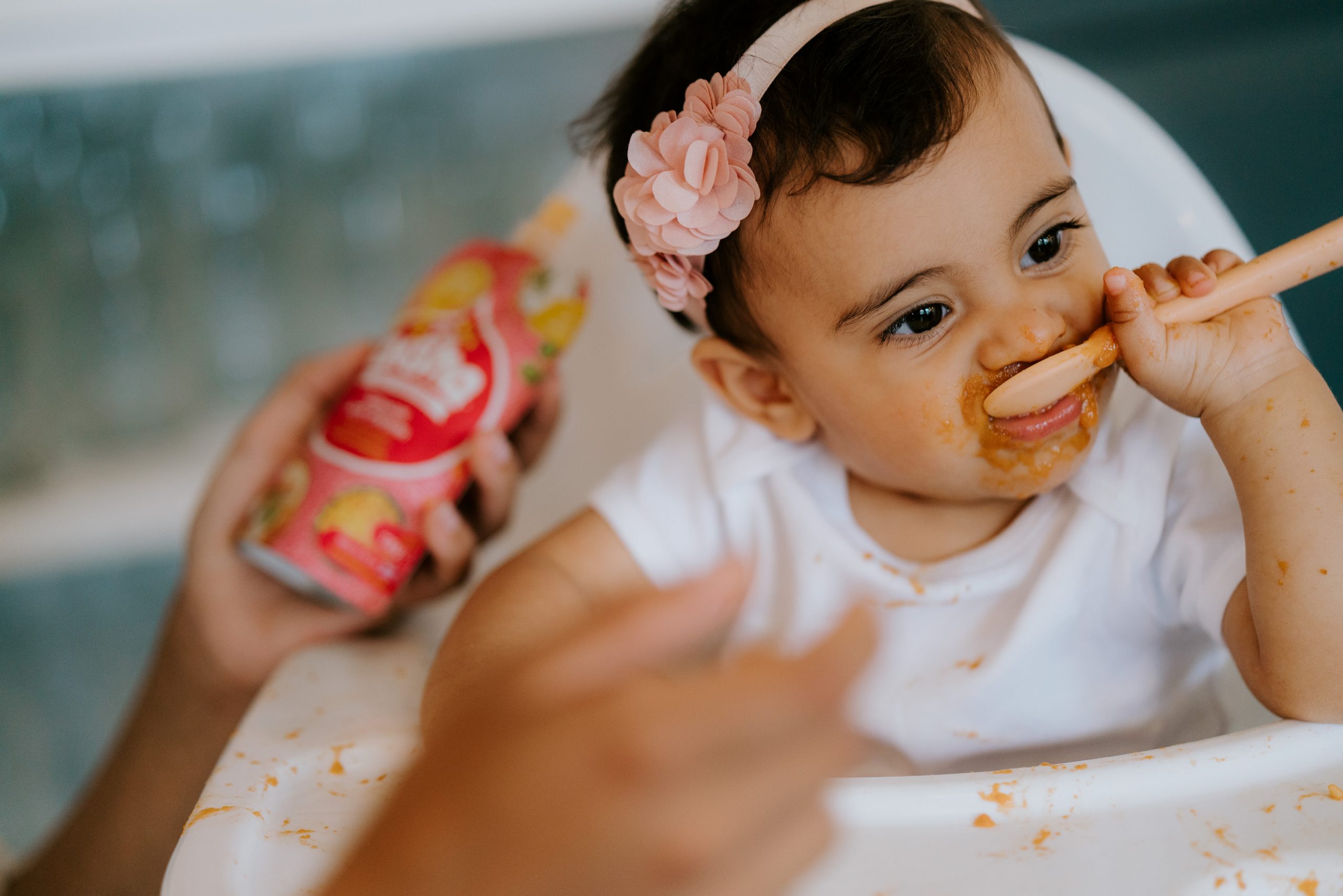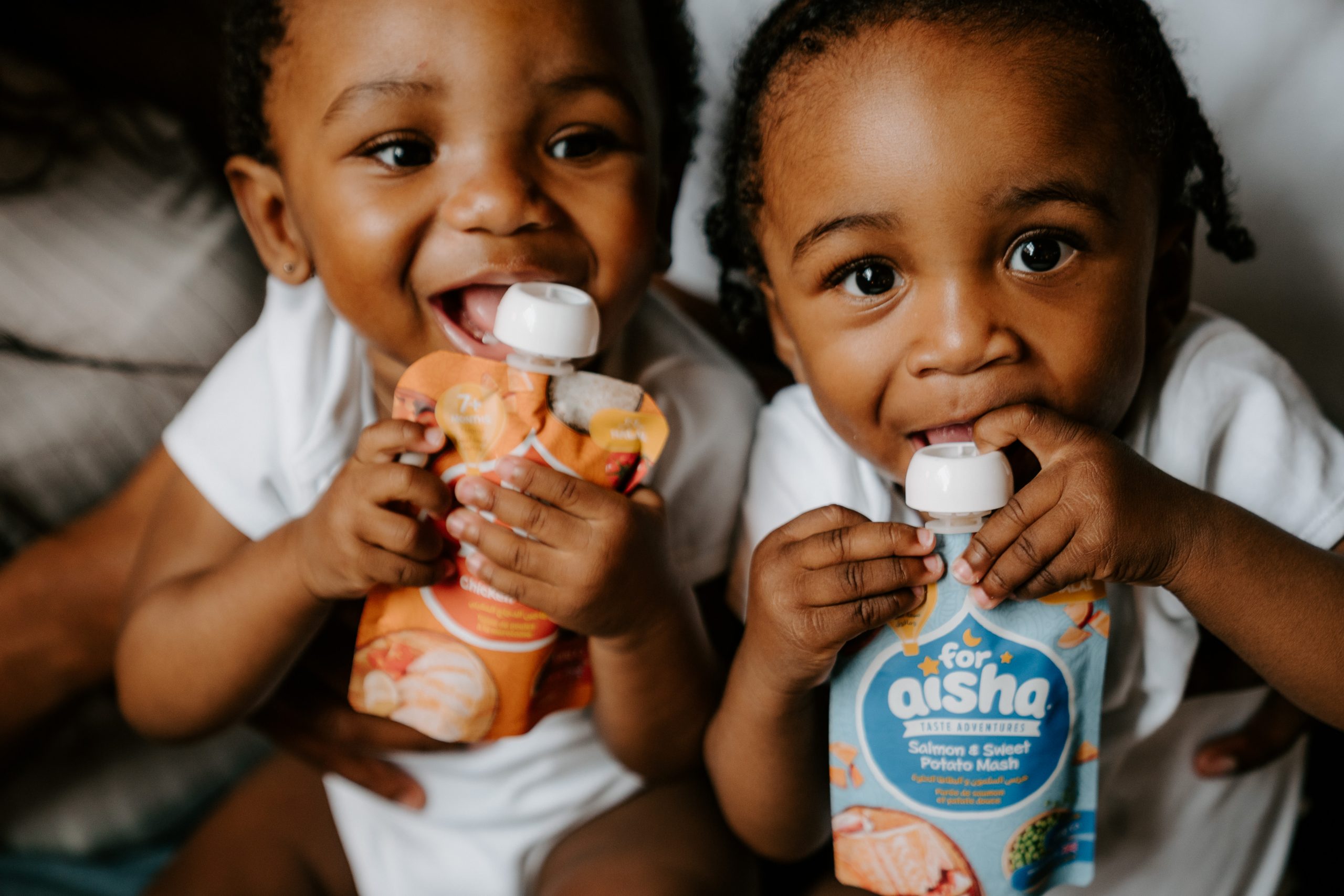
Ready to wean?
Our nutritionist, Priya Tew, gives advice on when to start weaning and the types of foods to try.
Signs your little one is ready for weaning:
It is recommended that weaning should start around 6 months, however all babies are different and some babies may be able to start a little earlier, from 4 months. If you plan to start weaning early do seek advice from your health visitor, dietitian or GP.
Whilst it can be tempting to dive into weaning to help your baby sleep through the night or to reduce the milk feeds they need it is important to wait until your little one is “developmentally ready” for weaning.
So how do you know your little person is ready? They need to be able to sit in the right position, be able to bring food to their mouths and they can chew and swallow. These are all signs to help you know they will be able to eat and digest their first tastes.
Some key things to check for:
– Can they sit up properly and stay in a seated position long enough to eat? This doesn’t have to be unaided, it is fine for them to be supported but they need to be upright and not slumped so they can swallow safely.
– Can they pick up something with their hands and pop it in their mouth? Babies often do this with toys so keep an eye out when they are playing.
– Have they stopped thrusting their tongue out. This is an early reflex where they stick their tongues out. You want your little one to be able to chew, move food around their mouth and swallow, not push the food back out.
How to start weaning:
How you start weaning is very much a personal preference, both for your baby and as a parent. Try to be led by your baby to see how much they would like to be spoon fed and how much they want to feed themselves on finger foods. Using purees can feel like a safer way to start weaning, however some older, more developed babies may want to feed themselves from the outset and this is totally fine too.
If you start with puree’s then it is important to progress baby onto solid foods in stages and to not delay too long. Try offering finger foods alongside purees to see how your little one manages with self feeding, or let them have the spoon for some of the meal.
You want to introduce baby to family meal and foods early on so they can get used to your home style of cooking. So try blending your normal meals, adjusting these for the salt content. Combining this approach with some commercial baby foods can introduce new foods and flavours to baby in a convenient and safe way. Plus pouches can be good when you are eating out of the house. These can be especially useful if you have concerns about any allergies or if your baby has special dietary needs. For Aisha’s range is always dairy-free, gluten-free, soy-free and egg-free so are a great choice if you’re worried about allergens when eating out. Fruit pouches can be used in so many ways throughout weaning and beyond, and any leftovers can be frozen into ice cube trays for another day. Try them mixed with yoghurt as a tasty dessert, add them to baking to reduce the sugar content of cakes and flapjacks or add them to smoothies.
Foods to start weaning on, fruit and vegetables are key:
Starting weaning with bitter vegetables can help your baby to accept the more bitter flavours in vegetables early on. A vegetable first approach has been shown to lead to children who eat a larger variety of foods. The key here is early introduction of vegetables and repeated exposure. By repeating the flavours they become familiar and infants will learn to accept the taste. For example, offering vegetables only as the first weaning foods for the first 10 days – 2 weeks has been shown to increase acceptance to veggies.
This doesn’t mean babies should not eat fruit! Eating 7-10 portions of fruit and vegetables a day is associated with a lower risk of certain cancers, obesity, type 2 diabetes and heart disease. Focus on giving a rainbow of fruit and vegetables over the week to ensure your baby is exposed to a variety of tastes and also nutrients. This is a great practice to continue through childhood and can make eating vegetables fun.
Adding flavours to fruit and vegetables can make them tastier and expose your little one to more flavours. The For Aisha range of fruit pouches have been designed to help introduce new flavours to your little ones palates, using exciting combinations of fruit, vegetables and spices. For example Tomato, Mango and Apricot and carrot, peach and turmeric.
Foods to take care with:
At age 6 months onwards you can give your baby pretty much all foods. They key ones to avoid or be aware of are: honey, nuts, eggs, salty foods, sugar and some cheeses, which are summarised below.
| Food to be aware of | |
| Honey | Not suitable for babies under 1 year due to a bacteria that can be harmful. |
| Nuts | Ground nuts are safe, but children under 5 yrs should not have whole nuts due to the risk of choking. |
| Eggs | Safe from 6 months in any forms as long as they have the red lion stamped on them to show they are British Lion Quality. Other quality eggs should be eaten well cooked. |
| Cheese | Stay away from unpasteurised cheese and milk due to the risk of listeria. |
| Salt | Babies up to 7 months old should eat less than 1 g salt per day and a maximum of 1g salt up till 1 year. Limit salty snacks and foods such as processed meats, use no added salt versions of foods and do not add salt to cooking, |
| Sugar | Avoid adding sugar to foods and drinks for your little one and choose lower sugar options whenever you can. |
Whilst a focus on vegetables and fruit is important at the start of weaning, it is key to build in all foods through the following months. Eating a varied diet right from the first steps of weaning will help your child get the range of tastes, nutrients and textures that are important for their physical health and sensory development.





